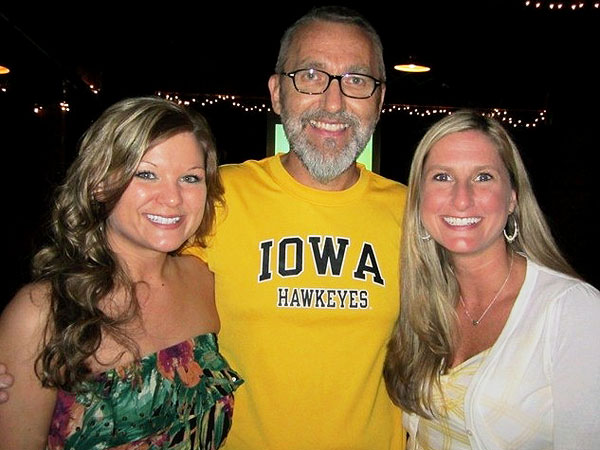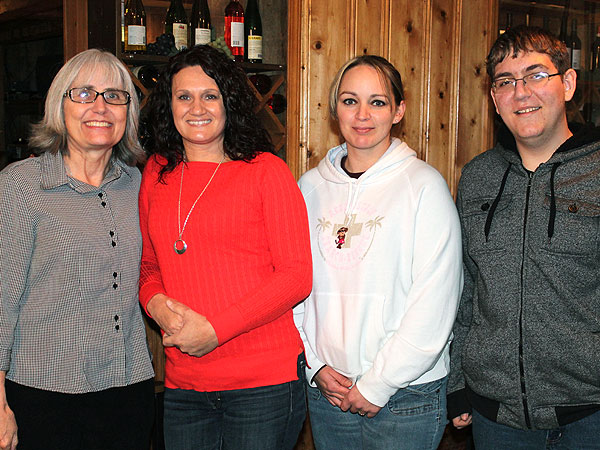This Valentine's Day, kidney transplant recipient Jerry Wilde is celebrating life with his family thanks to a devoted friend, a generous stranger – and Facebook.
When the kidney he had received through a transplant in 1992 developed a cancerous tumor and was surgically removed, Wilde was put back on dialysis and was told that just eight percent of people with his blood type could be his donor. Dozens of friends, family and colleagues were tested to see if they were a match, but to no avail.
"The waiting period for my blood type on the transplant list was long, between two and a half and three years," says Wilde, 50, a professor of educational psychology at Indiana University East. "I didn't think I'd survive that long. I thought, 'Well this just isn't going to happen. I'm just going to wither away.'"
But when Leah Hostalet, Wilde's friend and former student, saw a status update from Wilde in November of 2011 that he was in search of a kidney donor, she wanted to help.
On November 18 she set up a Facebook page, Find a Kidney for Jerry, which included his blood type and other pertinent medical information. Becky Melton – a total stranger to Wilde – saw the page that would change both their lives.
"I was looking for purpose in my life. It just struck me," says Melton, 28, who was scrolling through Facebook when she saw Jerry's page, "I thought, 'I want to do this. This is my guy. I am going to give him my kidney.' "
Melton, a loan processor in Richmond, Ind., and Wilde exchanged information. On December 14, Melton found out she was a match, and texted Wilde a photo of herself holding a sign with a picture of two kidneys on it. The sign read: "We're a match!" Wilde still gets choked up thinking about that day.
"I was standing in the living room in shock," he says. "I had never met this person. It's like, who does this for a complete stranger?"
On February 24, 2012, the transplant took place and Wilde has been healthy ever since.

From left: Becky Melton, Jerry Wilde and Lea Hostalet four months after his transplant
Courtesy Leah Hostalet
Though thrilled for her friend, Hostalet, a 33 year-old mom of three in Brownsburg, Ind., didn't feel her efforts were done.
"I felt drawn to this cause for some reason, and I felt like there was more I could do," she says.
Her solution? Find a Kidney Central, a hub for kidney donation pages that now is home to 161 people who are in need of a new kidney. In the year the page has been up and running it has linked donors for 38 transplants, and has grown from a bulletin board of information into a vibrant support community for those waiting for transplants.
"Everyone who is in need is so supportive of one another," says Hostalet, "The community feel to the page brings me such joy."
Pairing Kidneys Everywhere
The efforts have created a good will cascade effect: Leona Jones of Bedford, Ind., found and utilized Find a Kidney Central. In July, Jones got a call from her transplant coordinator, who had been contacted by Susan Yost, a woman who had seen Jones's page and wanted to donate her kidney. Though Yost and Jones were not a match, they agreed to participate in a paired donation program at IU Health University Hospital.
They were then connected to Peggy McCormick and her nephew Lucas, who needed a second transplant after his first transplanted kidney started to fail. Peggy donated her kidney to Leona, and Susan was a match for Lucas and donated a kidney to him.
"It was just like everything fit," says McCormick, 58, of donating her kidney to Jones. "It was a match made in heaven."
Doctors told McCormick that it was a miracle that Leona was matched.
"Two days before the transplant we all met," says McCormick. "After we had our preliminary labs done they got us all together in a room. There was a lot of hugging and crying."
Adds Jones, "It was very emotional ... I didn't know these people, and for someone to give up part of their body to you, it's indescribable."

From left: Peggy McCormick, Leona Jones, Susan Yost and Lucas McCormick
Courtesy Peggy McCormick
Hostalet has become a passionate advocate for kidney donation, and spends upwards of 28 hours a week on Facebook helping people set up their own pages and spreading information about her site.
Dr. Bryan Becker, transplant physician and former National Kidney Foundation president, calls Hostalet's work exceedingly important.
"Living kidney donor transplantation is a tremendous way to treat kidney failure with a better likelihood of a good outcome," he says.
Lifelong Bond
As for Wilde and Melton, the two say they share a lifelong bond. Melton is a graduate of IU East, and Wilde had a scholarship named after her, The Becky Melton Scholarship, which is given to a student who exemplifies the spirit of giving.
Hostalet, Melton, Wilde and Wilde's daughter met for dinner one night before the surgery. After dinner, Melton posted the following status on Facebook: "I just met four members of my family that I didn't know."
Hostalet says she is continually inspired by those who post to the site.
"Just seeing their strength, moving forward every day even though they're dealing with this extreme struggle in their lives, it makes me want to keep searching for them. I want to keep educating people as to how difficult dialysis is on the body, and the need for living donors."
As for her next steps, she says, "My plans are to keep this page running and spread as much awareness as possible. I'll take it wherever it leads me. I feel like I'm meant to do this."
Those who are interested in registering as an organ donor on Facebook can do so here.
More Heroes Among Us:
• Scott Neeson Left Hollywood to Save Kids in Cambodia's Slums
• Woman Who Lost her Legs in Tornado Starts Foundation to Help Others
Know a hero? Send suggestions to heroesamongus@peoplemag.com. For more inspiring stories, read the latest issue of PEOPLE magazine











